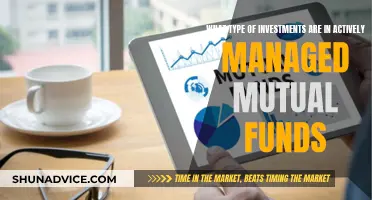
With so many investment options available, it can be challenging to decide where to put your money. A good place to start is to look at the current trends and see where other investors are putting their cash.
Tech funds, global funds, and ETFs have been popular in 2024, with the L&G Global Technology Index topping the list as the most-bought fund on the Interactive Investor platform in August. Despite a dramatic sell-off in the tech sector earlier in the summer, Nvidia was the best-selling stock on the platform. This shows that Big Tech continues to be one of the main forces driving the market.
Another trend to note is that US equities have recovered almost all the ground lost between mid-July and early August, with the S&P Total Market Index rising almost 18% year-to-date. This has made Vanguard's US Equity Index Fund a popular choice.
When choosing an investment fund, it's important to consider your investment goals and risk tolerance. If you're looking for a well-diversified, low-cost option, index funds are a good choice. These funds aim to replicate the performance of a market index, such as the S&P 500, and are less risky than investing in individual stocks.
- Fidelity ZERO Large Cap Index
- Vanguard S&P 500 ETF
- SPDR S&P 500 ETF Trust
- iShares Core S&P 500 ETF
- Schwab S&P 500 Index Fund
- Vanguard Russell 2000 ETF
- Vanguard Total Stock Market ETF
Remember, it's crucial to do your own research and consider seeking advice from a qualified professional before making any investment decisions.
What You'll Learn

The best index funds to invest in
Index funds are a great way to invest in a diverse range of stocks at a low cost. They are also less risky than investing in individual stocks. Here are some of the best index funds to invest in right now:
Fidelity ZERO Large Cap Index Fund
This fund has a 0% expense ratio, meaning there are no fees associated with investing in this fund. It tracks an index of over 500 large-cap US stocks and its performance is very similar to an S&P 500 index fund. It also has no minimum investment, making it a good choice for beginner investors.
Schwab S&P 500 Index Fund
This fund is an official S&P 500 index fund with an expense ratio of just 0.02%. That means you only pay $0.20 annually for every $1,000 you invest. There is no minimum investment amount, so you can start investing with as little as $1.
Vanguard Growth ETF
This fund assumes more investment risk but offers the potential for higher rewards. It has a minuscule 0.04% expense ratio and invests in 200 large-cap growth stocks, with a focus on consumer discretionary and industrial stocks.
SPDR S&P Dividend ETF
This fund is a top-performing index fund for income-oriented investors. It has a dividend yield of 2.49% and an expense ratio of 0.35%. The fund invests in companies that have increased their dividend payments annually for at least 25 consecutive years.
Vanguard Real Estate ETF
This fund offers exposure to the real estate market with an expense ratio of just 0.12%. It is the largest real estate index fund with total net assets of over $59 billion. It invests primarily in equity REITs, which own and operate income-producing real estate.
Vanguard Russell 2000 ETF
This fund offers exposure to small- and mid-cap companies, with a focus on industrials, financials, and healthcare. It has an expense ratio of 0.1%, which is relatively low for a fund offering exposure to high-growth potential companies.
ROBO Global Robotics and Automation Index ETF
This fund offers investors a way to capitalize on the long-term growth of robotics, automation, and artificial intelligence. It has a 0.95% expense ratio, higher than the other funds on this list, but it offers exposure to booming trends with high growth potential.
Vanguard Total Stock Market ETF
This fund offers exposure to small, medium, and large companies across all sectors. It has been around since 2001 and has an expense ratio of just 0.03%.
Strategies for Picking a Hedge Fund to Invest In
You may want to see also

The best equity funds to invest in
Equity funds are a smart way to grow your money and achieve your financial goals. They are managed by professionals and offer superior liquidity. Here are some of the best equity funds to invest in now:
Top Equity Mutual Funds
According to ET Money, the following are the top 5 equity mutual funds in terms of 5-year annualized returns:
- Nippon India Small Cap Fund
- HDFC Mid-Cap Opportunities Fund
- Nippon India Multi Cap Fund
- ICICI Prudential BHARAT 22 FOF Scheme
Top Performing Fund Managers
Money to the Masses lists the following as the top 10 performing fund managers over the last five calendar years (up to May 2024):
- Peter Rutter / Will Kenney / James Clarke (Royal London Global Equity Select)
- Bimal Patel / Mike Willans (WS Canlife North American/WS Canlife Global Equity)
- TM Natixis Loomis Sayles U.S. Equity Leaders (Albert Tsuei / Peter J. Bye)
- Stephen Kelly / David Shaw (AXA Framlington American Growth)
- Alison Porter / Graeme Clark / Richard Clode (Janus Henderson Global Technology Leaders)
- Artemis Global Income
- IFSL Marlborough US Multi-Cap Income
- BlackRock US Dynamic (Alex Tedder TR in GB)
- Schroder Global Equity
- William Warren TR in GB
Top Index Funds
According to Bankrate, the following are some of the best index funds on the market, offering broad diversification at low cost:
- Fidelity ZERO Large Cap Index
- Vanguard S&P 500 ETF
- SPDR S&P 500 ETF Trust
- IShares Core S&P 500 ETF
- Schwab S&P 500 Index Fund
- Shelton NASDAQ-100 Index Direct
- Invesco QQQ Trust ETF
- Vanguard Russell 2000 ETF
- Vanguard Total Stock Market ETF
- SPDR Dow Jones Industrial Average ETF Trust
Top Investment Funds
MoneyWeek reveals the following as the top investment funds for September 2024:
- L&G Global Technology Index
- Vanguard LifeStrategy 80% Equity
- Royal London Short Term Money Market
- HSBC FTSE All-World Index
- Vanguard LifeStrategy 100% Equity
- Vanguard FTSE Global All Cap Index
- Fidelity Index World
- Vanguard LifeStrategy 60% Index
- Vanguard US Equity Index
Other Recommendations
Money to the Masses also provides a list of the top-performing funds over 5 and 10 years. However, they caution that past performance does not guarantee future results. They recommend choosing funds that suit the current economic and investment environment.
Additionally, The Motley Fool offers seven investment options for those looking to invest $1,000:
- Start a savings account
- Invest in a 401(k)
- Starting an IRA
- Open a taxable brokerage account
- Use a robo-advisor
- Invest in individual stocks
- Other recommendations: open an IRA or brokerage account and consider investing in exchange-traded funds (ETFs)
Rental Property vs Mutual Funds: Which is the Better Investment?
You may want to see also

The best funds for beginners
When it comes to investing in funds, there are no guarantees, and it's important to remember that you could lose money as well as make it. With that in mind, here are some tips for beginners looking to invest in funds.
Do your research
Before investing, it's important to do your research and understand the different types of funds available. Funds can be mutual funds or exchange-traded funds (ETFs) and they can invest in almost anything, from government bonds to fledgling technology firms.
Understand the risks
Investing in funds is generally less risky than investing in individual stocks because your investment is diversified across a range of companies or assets. However, it's still possible to lose money, and the value of your investment can go down as well as up.
Consider the fees
Funds typically charge fees, known as an expense ratio, which can eat into your returns. These fees vary from fund to fund, so it's important to compare them before investing. Some funds also charge sales loads or commissions, which can further reduce your returns.
Diversify your investments
To reduce risk, it's generally recommended that you diversify your investments across different companies, industries, and regions. This means that if one investment performs poorly, it won't have a significant impact on your overall portfolio.
Invest for the long term
Investing is generally recommended for those who can invest for the long term (at least five years). This gives your investments time to ride out any bumps in the market and increase the chances of seeing positive returns.
Choose the right platform
When investing in funds, you'll typically use an online platform, often called a broker. Different platforms offer access to different funds, and they may also charge different fees, so it's important to compare them before choosing one.
Start with a small amount
When you're first starting out, it's generally recommended that you start with a small amount of money that you can afford to lose. This will help you get a feel for the market and reduce the risk of losing a large amount of money.
Consider index funds
Index funds are a type of fund that tracks a specific stock market index, such as the S&P 500. These funds are popular with beginners because they offer immediate diversification at a low cost. Some of the best S&P 500 index funds include:
- Fidelity ZERO Large Cap Index
- Vanguard S&P 500 ETF
- SPDR S&P 500 ETF Trust
- IShares Core S&P 500 ETF
- Schwab S&P 500 Index Fund
Consider Nasdaq index funds
Nasdaq index funds track the performance of the largest non-financial companies in the Nasdaq-100 Index, which is heavily weighted towards technology companies. Examples include:
- Shelton NASDAQ-100 Index Direct
- Invesco QQQ Trust ETF
Other popular index funds
There are also index funds that track other parts of the market, such as small-cap companies or specific industries. Some examples include:
- Vanguard Russell 2000 ETF (tracks small-cap companies)
- Vanguard Total Stock Market ETF (tracks a broad range of companies)
- SPDR Dow Jones Industrial Average ETF Trust (tracks blue-chip companies)
UK Index Funds: Where to Invest Your Money Wisely
You may want to see also

The best funds for diversification
When it comes to investing in funds, diversification is key. Diversification is a crucial concept in investing, as it may seem paradoxical, but combining individually volatile assets can actually stabilise the overall risk of a portfolio.
Exchange-Traded Funds (ETFs)
ETFs are a great way to achieve diversification as they offer access to a wide array of asset classes. Retail investors can mix and match ETFs to build a well-rounded, resilient portfolio. Here are some ETFs to consider:
- IShares Core Moderate Allocation ETF (AOM)
- IShares MSCI World ETF (URTH)
- Vanguard Total World Bond ETF (BNDW)
- IShares National Muni Bond ETF (MUB)
- SPDR Gold MiniShares Trust (GLDM)
- IShares Global Energy ETF (IXC)
- Invesco S&P 100 Equal Weight ETF (EQWL)
- SPDR Dow Jones REIT ETF (RWR)
Index Funds
Index funds are mutual funds or ETFs that track a preset basket of stocks or an index. They are popular due to their diversification, low risk, and attractive returns. Here are some of the best index funds:
- Fidelity ZERO Large Cap Index
- Vanguard S&P 500 ETF
- SPDR S&P 500 ETF Trust
- IShares Core S&P 500 ETF
- Schwab S&P 500 Index Fund
- Vanguard Russell 2000 ETF
- Vanguard Total Stock Market ETF
- SPDR Dow Jones Industrial Average ETF Trust
Mutual Funds
Mutual funds are another option for investors seeking diversification. While they may have higher fees compared to ETFs, they offer professional management and a diverse portfolio of stocks, bonds, or other assets. Here are some top-performing mutual funds:
- Royal London Global Equity Select
- WS Canlife North American/WS Canlife Global Equity
- AXA Framlington American Growth
- Janus Henderson Global Technology Leaders
- Artemis Global Income
- BlackRock US Dynamic
Multi-Cap Funds
Multi-cap funds invest in large-cap, mid-cap, and small-cap stocks, providing investors with broader market exposure. They are considered less risky and can provide higher returns. Some of the best multi-cap funds include:
- Mirae Asset Tax Saver Fund
- Canara Robeco Equity Taxsaver Fund
- Axis Long Term Equity Fund
- ICICI Prudential Long Term Equity Fund Tax Saving
- SBI Magnum Long Term Equity Scheme
Remember, when investing, it is crucial to conduct thorough research and consider your financial goals, risk tolerance, and investment horizon. Diversification is a long-term strategy, and it's important to regularly review and rebalance your portfolio to maintain the desired level of diversification.
Fidelity Investments: Where Are Shareholder Funds Held?
You may want to see also

The best funds for long-term investing
When it comes to investing, there is no one-size-fits-all approach. The best funds for long-term investing will depend on your personal circumstances, financial goals, and tolerance for risk. That being said, here are some options for funds that are suitable for long-term investing:
Index Funds
Index funds are a type of investment fund that aims to replicate the performance of a particular stock market index, such as the S&P 500. They are passively managed, meaning their holdings are determined by the index they track. Index funds are a good choice for long-term investors as they allow you to lock in the returns of the overall stock market or a specific segment. Some examples of index funds include:
- Fidelity ZERO Large Cap Index Fund
- Schwab S&P 500 Index Fund
- Vanguard Russell 2000 ETF
- ROBO Global Robotics and Automation Index ETF
- SPDR S&P 500 ETF Trust
Exchange-Traded Funds (ETFs)
ETFs are similar to index funds in that they track a particular market index. However, they are traded on stock exchanges, and shares can be purchased and sold by investors. ETFs tend to have lower fees than active funds, making them a popular choice. Examples of ETFs include:
- Vanguard US Equity Index
- Vanguard FTSE Global All Cap Index
- Vanguard Real Estate ETF
- Vanguard Total Stock Market ETF
Active Investment Funds
Active investment funds strive to outperform a particular stock market index or benchmark. Fund professionals actively manage these funds using analysis, research, and judgment. Active funds tend to cost more than passive funds like index funds and ETFs, but they offer the potential for superior returns. Examples of active funds include:
- Royal London Global Equity Select
- AXA Framlington American Growth
- Janus Henderson Global Technology Leaders
- Artemis Global Income
- Vanguard Growth ETF
Stocks and Shares
Investing in individual stocks and shares is a well-known and popular option for investors. This approach can offer the potential for greater returns than funds, but it also comes with higher risk. It is important to have a long-term investment horizon and a high tolerance for risk when investing in individual stocks. Some popular stocks include:
- Nvidia
- Amazon
- Glencore
- Rio Tinto
- BP
Bonds
Bonds are another option for long-term investing. They are considered less risky than stocks or shares-based funds and provide regular income payments. Bonds can be issued by governments or companies and are traded on the stock market. Examples of bonds include:
- UK government gilts
- US government treasuries
- Corporate bonds
Remember, it is important to do your own research and consult with a financial advisor before making any investment decisions. The above options are meant to provide a starting point for your long-term investment journey.
Vanguard Funds: Best Investment Options for Now
You may want to see also
Frequently asked questions
Index funds are a great option for beginners as they require little knowledge about investing or financial markets. They are also a good way to diversify your portfolio and lower risk.
There are taxable brokerage accounts, 401(k)s, and Individual Retirement Accounts (IRAs).
The Vanguard S&P 500 ETF, SPDR S&P 500 ETF Trust, iShares Core S&P 500 ETF, and Fidelity ZERO Large Cap Index are some of the best index funds to invest in.
The Fidelity Select Semiconductors, Fidelity Series Growth Company, and Fidelity Select Technology are some of the best-performing mutual funds for this month.







